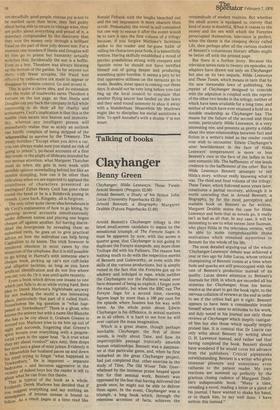Talking of books
Clayhanger
Benny Green
Clayhanger, Hilda Lessways, These Twain Arnold Bennett (Penguin £2,00) Arnold Bennett, a Study of his fiction John Lucas (University Paperbacks E2.30) Arnold Bennett, a Biography Margaret Drabble (Futura Paperbacks £1.60) Arnold Bennett's Clayhanger trilogy is the latest small-screen candidate to aspire to the sensational triumph of The Forsyte Saga; it must be apparent by now, with the series a quarter gone, that Clayhanger is not going to duplicate the Forsyte stampede, any more than Trollope did with his Pallisers. The reason has nothing much to do with the respective merits of Bennett and Galsworthy, or even with the skills of the various productions, but is simply rooted in the fact that the Forsytes got up to adultery and indulged in rape, while neither the Clayhangers nor the Pallisers would ever have dreamed of being so explicit. I forget now the exact statistic, but when the BBC ran The Forsyte Saga for a second time, viewing figures leapt by more than a 100 per cent for the episode where Soames has his way with Irene. As the whole point about Edwin Clayhanger is his diffidence, in sexual matters as in all others, it is hard to see how he will ever capture the mass imagination.
Which is a great shame, though perhaps inevitable. Clayhanger, the first of three novels, is really about Time, and how its imperceptible passage ironically amends human relationships. Bennett was a pastmaster at that particular game, and, when he first embarked on the great Clayhanger project, had just completed that other exercise in the study of Time, The Old Wives' Tale. Overwhelmed by the immense praise heaped upon him for that seminal work, Bennett was oppressed by the fear that having delivered the goods once, he might not be able to deliver them again. In the event, Clayhanger was a triumph, a long book which, through the relentless accretion of facts, achieves the verisimiltude of modest realities. But whether the small screen is equipped to convey that kind of irony is doubtful. When it comes to the money and the sex with which the Forsytes preoccupied themselves, television is perfect; when the theme is the creeping decay called Life, then perhaps after all the curious student of Bennett's voluminous literary affairs might be better off with the printed page.
But there is a further irony. Because the television series runs to twenty six episodes, its adapters have drawn not only on Clayhanger but also on its two sequels, Hilda Lessways and These Twain, which means in turn that by the new inexorable laws of publishing, the _reprint of Clayhanger designed to coincide with the adptation is coupled with the reprint of the other two books in the trilogy, neither of which have been available for a long time, and neither of which have ever retained a hold on a sizeable readership as Clayhanger has. The reason for the failure of the second and third novels, particularly Hilda Lessways, is a very interesting one, and presents as pretty a riddle about the inter-relationships between fact and fiction in a writer's mind as the reader could ever wish to encounter. Edwin Clayhanger's utter bewilderment in the face of Hilda Lessways' temperament is more or less Bennett's own in the face of the ladies in his own romantic life. The bafflement of one lends credence to the bafflement of the other. But in Hilda Lessways Bennett attempts to tell Hilda's story, without really knowing what it was. The third and final volume of the trilogy, These Twain, which followed some years later, constitutes a partial recovery, although it is worth conceding that in Arnold Bennett, a Biography, by far the most perceptive and readable book on Bennett so far written, Margaret Drabble states the case for Hilda Lessways and feels that as novels go, it really isn't as bad as all that. In any case, it will be interesting to see to what extent Jane Suzm an, who plays Hilda ,in the television version, will be able to make comprehensible those motivations which remained mysterious to Bennett for the whole of his life.
The most detailed arguing-out of the whole 'Clayhanger-Lessways' debate was achieved a year or two ago by John Lucas, whose critical championing of Bennett comes at a time when fools and quacks are still preoccupied with the rate of Bennett's production instead of its quality. Lucas draws attention to Bennett's Journals for 1910, in which are recorded all his anxieties for Clayhanger, from his heroic resolve at the start to get the book right, to the nervous collation of reviews at the end in order to see if the critics had got it right. Bennett appears to have been a considerable ironist himself when it came to attitudes to his work, and duly noted in his journal not only those reviews of Clayhanger which ineptly castigated him but also those which equally ineptly praised him. It is comical that Dr Leavis can only write about Bennett by writing about D. H. Lawrence instead, and rather sad that having completed the book, Bennett should have wondered if he would cover his advance from the publishers. Critical pipsqueaks notwithstanding, Bennett is a writer who gives immense pleasure and sometimes even catharsis to the patient reader. My own reactions are summed up perfectly by the gracious closing cadence of Margaret Drabble's indispensable book: "Many a time, rereading a novel, reading a letter or a piece of his journal, I have wanted to shake his hand, or to thank him, to say well done. I have written this instead."


























 Previous page
Previous page